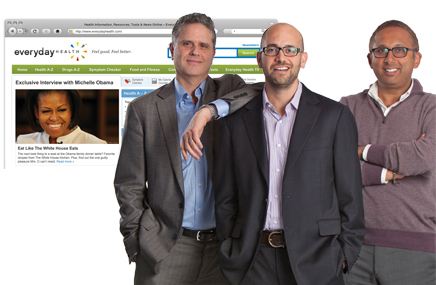Pulling back is not the expected answer from a media team that has seen its viewership grow, garnering the second most unique visitors—28.6 million in October 2012—in a health information space that includes WebMD and Yahoo!Health.
Yet pulling back is exactly what Everyday Health, which manages 25 health properties, is determined to do. Because its visitors asked it to.
“What we have heard loudly from our consumer is ‘we want less, don’t try to cover the full universe…provide real depth in areas that we are interested in,’” co-founder and CEO Ben Wolin told MM&M.
This means that Everyday Health will still offer general lifestyle stories, while putting an emphasis on chronic conditions, like obesity and diabetes. What will be different about its approach has its basis in what has always made Everyday Health’s coverage different. In addition to traditional online medical information, the site’s content will include “living with” information, which means taking a 360-degree informational approach, as opposed to a strictly head-on one.
As Paul Slavin, SVP and general manager, explains it, that added information helps a mom go beyond learning about a family diabetes diagnosis to understanding how to construct a supportive environment that will make it easier for the newly-diabetic to stick to a lifestyle plan. It also means finding the right narrative form and designing content to be viewed on multiple screens as consumers opt for mobile technology over desktops.

Danny Boome is host and chef of Everyday Health’s Recipe Rehab show
Both Wolin and Slavin say the corporate ethos of entrepreneurship has helped the company launch a large video library in less than a year, as well as implementing mobile-friendly content years before they’d planned to.
“The same DNA that allowed us to start the company,” Wolin says, “allowed us to be nimble and say, ‘Look, this is what’s coming [into] the marketplace and we need to move.’”

Beyond the consumer-facing appeal that comes with being linked to bold-faced names like trainer Jillian Michaels, is the company’s ability to translate user data points into what consumers desire and how marketers can benefit. Among the examples Wolin cited was a diabetes client which saw a $3 dollar return for every $1 spent with Everyday Health.
“It’s really about the data. At the end of the day the evolution or revolution there was our ability to prove out the efficacy of our marketing program…it’s one of the main reasons we are succeeding,” Wolin said.
This success means the new ad revenue is from not just new clients but broader, deeper relationships with existing ones.
Part of keeping the revolution going, will be a reorganization that Slavin said will change the playing field and help the company “focus on those things which we know our consumers and advertisers are particularly interested in.”
Said Slavin: “It’s all about keeping the dialogue open and acknowledging we all have things to achieve.
From the January 01, 2013 Issue of MM+M - Medical Marketing and Media








